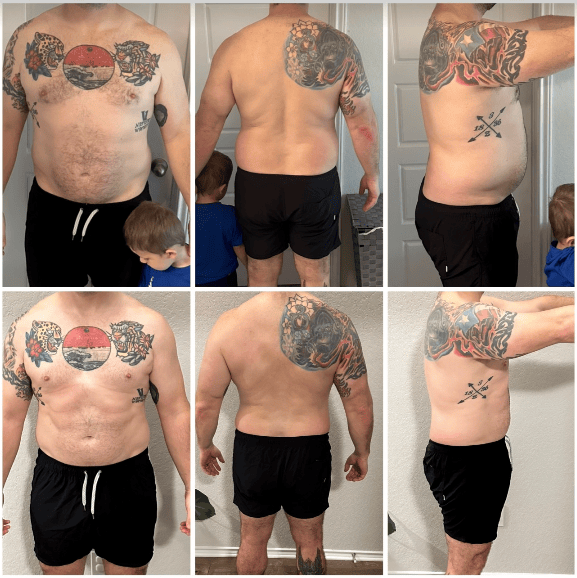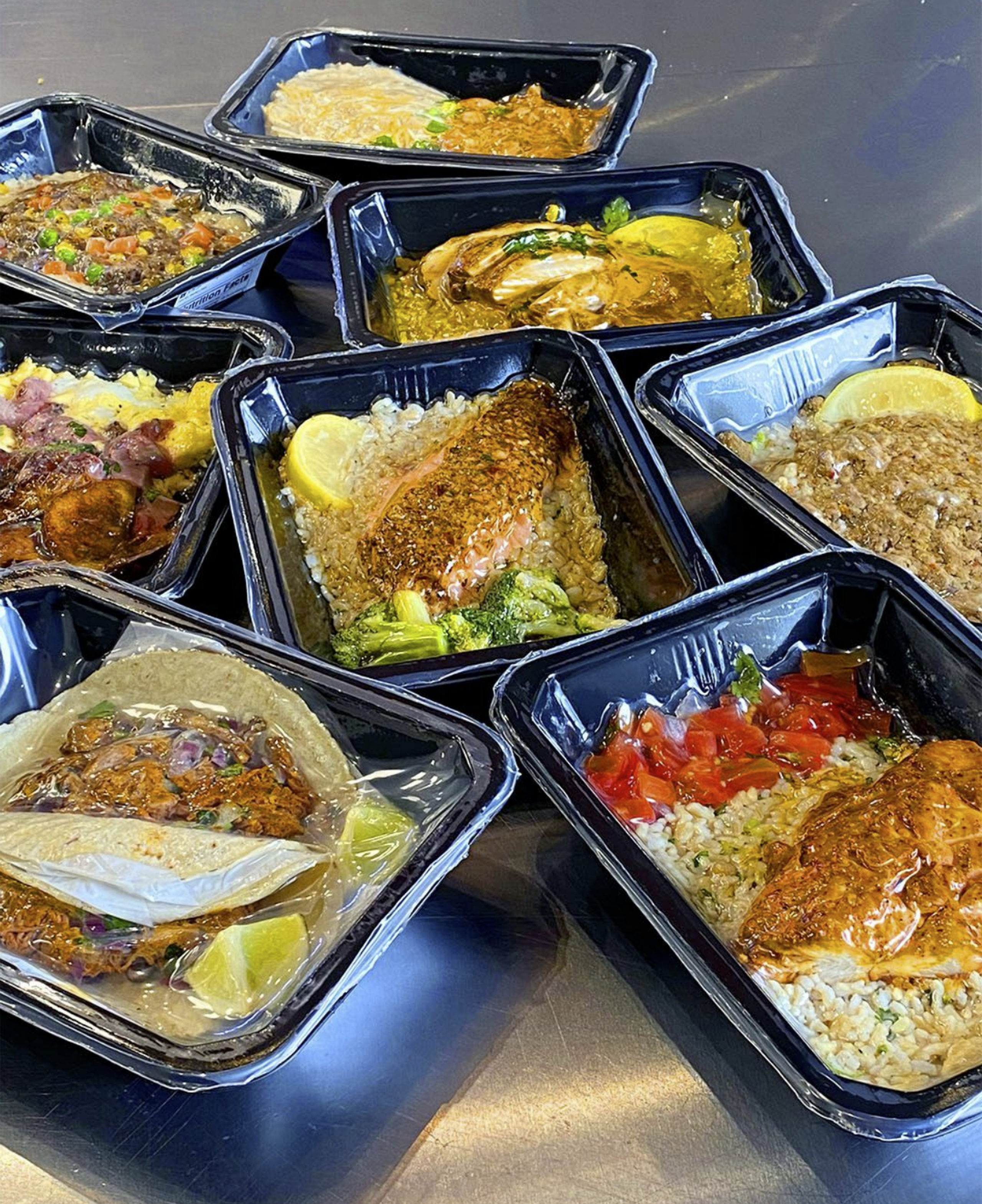This is such a real life question and you probably already have a hunch about what the answer might be on myfitfoods.com, but a recent fancy meta-analysis published in the Journal of the Academy of Nutrition and Dietetics explored this exact question analyzing 22 studies with 1,982 participants [1].
Here is what the study found:
- Utilizing shakes or pre-packaged pre-portioned meals as meal replacements outperformed calorie-restricted diets without meal replacements for weight loss.
- The more meals people replaced the greater the advantage.
- Three meals replaced showed the largest advantage.
- Two meals replaced still showed a significant advantage, but not by as much.
- One meal replaced did not show a statistically significant advantage over calorie-restricted diets without meal replacements.
Below is a summary quote from the paper itself.
“To the best of the authors’ knowledge, this is the first systematic review and meta-analysis to analyze the effects of meal replacement diets (i.e. shakes or pre-packaged pre-portioned meals) on weight loss compared to calorie-restricted diets without meal replacements…
These results show that replacing three meals with meal replacements per day, at least at the beginning of meal replacement plans, will help patients lose weight successfully by increasing initial weight loss and motivation…
According to this systematic review and meta-analysis, the effect of meal replacement based low energy diets on weight loss was superior to that of calorie-restricted diets without meal replacements.”* -Min et al., 2021 [1]
This in no way means that dietary advice and cooking can’t work. We know that many people see results with these types of approaches, but the speed of fat loss is consistently slower with dietary advice and cooking compared to when people use measured out pre-portioned pre-packaged options [2-6]. This makes a ton of sense because there is a lot of learning, experience, and consistent effort that is needed to grocery shop, cook, and portion out your own food effectively.
Our goal is absolutely not for people to eat 100% My Fit Foods forever, that’s silly and unrealistic.
Our goal is for people to use My Fit Foods in a way that fits their life and helps them get easier results while making healthy eating more convenient and delicious. We fully expect the amount of meals people eat from us to change and adapt with their needs over time and our My Fit Life nutrition coaches actually help people do exactly that in an evidence-based way.
The research community has known for a quite some time that giving people pre-portioned food consistently outperforms just giving people dietary advice [7-12], but this new study confirms these findings and also highlights that people who replace three meals seem to get the best results, two meals still shows an advantage, but not by as much, and replacing just one meal did not show a significant weight loss advantage over calorie-restricted diets without meal replacements.
These findings seem pretty straight forward to me and I think they can help us in how we utilize My Fit Foods through the active fat loss phase and beyond.
In the beginning, it can make so much sense for some people to go hard in the paint and use the highest amount of pre-portioned meals, shakes, and/or snacks that fit into their life. I would especially do this if someone is highly motivated, doesn’t have the time/desire to grocery shop, cook, and portion their own food while also expecting faster early weight loss.
If someone is going to cook and portion their own food, no big deal at all, I would just want them to know that if they truly want to see results at the same pace (or results at all if I am being honest) they would need to keep things tight AKA no snacking while they are cooking, no heaping cups, no extra snibbles here and there…and that’s HARD!
No one likes weighing and measuring two tablespoons of peanut butter or four ounces of rice and people very likely don’t need that level of control forever to maintain their results, but most people will need a higher level of planning and mental oversight through the active fat loss phase to maintain a caloric deficit because we tend to underestimate the calorie content of our food by at least 20-50% [13-18].
I also don’t see replacing just one meal as a loss because one to two meal replacements per day as a standalone strategy may be able to prevent weight regain over as long as three years [19] and given that 80% of people regain the majority of their lost weight at one year [20] this may be an even more important finding!
To summarize, pre-packaged, pre-portioned meals seem to help people lose weight and replacing more meals seems to help more.
How can having ready-to-eat delicious meals help you?
#GIVEAFIT

*The researchers used the term food based diets in the original text and I found this quite confusing so I changed the terminology to what they used in the eligibility section “calorie-restricted diets without meal replacements” as this wording makes a lot more sense to me.
REFERENCES:
1. Min, J., et al., The Effect of Meal Replacement on Weight Loss According to Calorie-Restriction Type and Proportion of Energy Intake: A Systematic Review and Meta-Analysis of Randomized Controlled Trials. J Acad Nutr Diet, 2021. 121(8): p. 1551-1564 e3.
2. Raben, A., et al., The PREVIEW intervention study: Results from a 3-year randomized 2 x 2 factorial multinational trial investigating the role of protein, glycaemic index and physical activity for prevention of type 2 diabetes. Diabetes Obes Metab, 2021. 23(2): p. 324-337.
3. Forman, E.M., et al., Acceptance-based versus standard behavioral treatment for obesity: Results from the mind your health randomized controlled trial. Obesity (Silver Spring), 2016. 24(10): p. 2050-6.
4. Forman, E.M., et al., Comparison of acceptance-based and standard cognitive-based coping strategies for craving sweets in overweight and obese women. Eat Behav, 2013. 14(1): p. 64-8.
5. Forman, E.M., et al., Long-Term Follow-up of the Mind Your Health Project: Acceptance-Based versus Standard Behavioral Treatment for Obesity. Obesity (Silver Spring), 2019. 27(4): p. 565-571.
6. Salvia, M.G., The Look AHEAD Trial: Translating Lessons Learned Into Clinical Practice and Further Study. Diabetes Spectr, 2017. 30(3): p. 166-170.
7. Rock, C.L., et al., Randomized clinical trial of portion-controlled prepackaged foods to promote weight loss. Obesity (Silver Spring), 2016. 24(6): p. 1230-7.
8. Mellor, D.D., et al., Weight loss in a UK commercial all meal provision study: a randomised controlled trial. J Hum Nutr Diet, 2014. 27(4): p. 377-83.
9. Foster, G.D., et al., A randomized comparison of a commercially available portion-controlled weight-loss intervention with a diabetes self-management education program. Nutr Diabetes, 2013. 3: p. e63.
10. Cook, C.M., et al., A Commercially Available Portion-Controlled Diet Program Is More Effective for Weight Loss than a Self-Directed Diet: Results from a Randomized Clinical Trial. Front Nutr, 2017. 4: p. 55.
11. Hannum, S.M., et al., Use of portion-controlled entrees enhances weight loss in women. Obes Res, 2004. 12(3): p. 538-46.
12. Hannum, S.M., et al., Use of packaged entrees as part of a weight-loss diet in overweight men: an 8-week randomized clinical trial. Diabetes Obes Metab, 2006. 8(2): p. 146-55.
13. Konig, L.M., K. Ziesemer, and B. Renner, Quantifying Actual and Perceived Inaccuracy When Estimating the Sugar, Energy Content and Portion Size of Foods. Nutrients, 2019. 11(10).
14. Zhou, J., et al., Calorie Estimation From Pictures of Food: Crowdsourcing Study. Interact J Med Res, 2018. 7(2): p. e17.
15. Lichtman, S.W., et al., Discrepancy between self-reported and actual caloric intake and exercise in obese subjects. N Engl J Med, 1992. 327(27): p. 1893-8.
16. Champagne, C.M., et al., Energy intake and energy expenditure: a controlled study comparing dietitians and non-dietitians. J Am Diet Assoc, 2002. 102(10): p. 1428-32.
17. Dahle, J.H., et al., Underreporting of energy intake in weight loss maintainers. Am J Clin Nutr, 2021.
18. McKenzie, B.L., et al., Investigating sex differences in the accuracy of dietary assessment methods to measure energy intake in adults: a systematic review and meta-analysis. Am J Clin Nutr, 2021. 113(5): p. 1241-1255.
19. Christensen, P., et al., Long-term weight-loss maintenance in obese patients with knee osteoarthritis: a randomized trial. Am J Clin Nutr, 2017. 106(3): p. 755-763.
20. Wing, R.R. and S. Phelan, Long-term weight loss maintenance. Am J Clin Nutr, 2005. 82(1 Suppl): p. 222S-225S.
About Author: Mario Mendias





